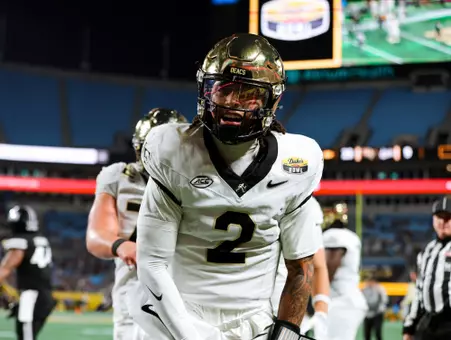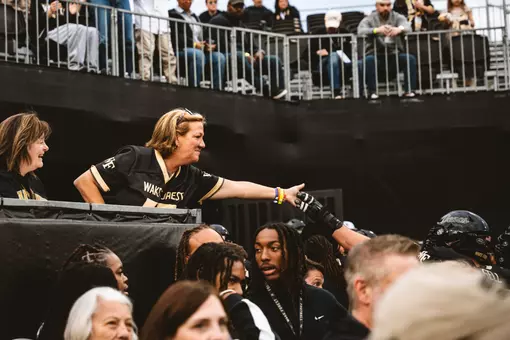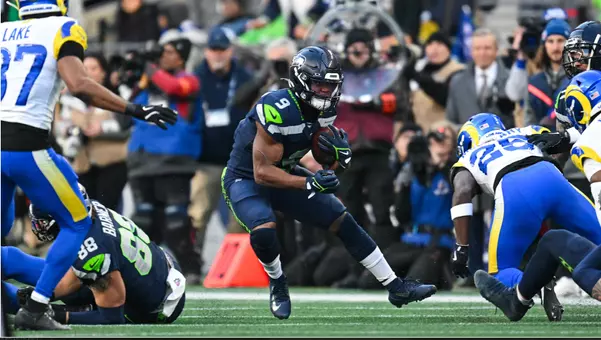Wake Forest Athletics
Gold Rush: 2003 Football Wrap
12/10/2003 12:00:00 AM | Football
Dec. 10, 2003
By Sam Walker
Although the 2003 record may not indicate it, this may well have been the best coaching job Jim Grobe and his staff have turned in since taking over the Wake Forest football program three seasons ago. At 5-7 overall and 3-5 in the ACC, the Deacons completed the first losing season of Grobe's tenure. But looking realistically at the big picture, and by Grobe's own lofty standards, the 2003 Demon Deacons were overachievers.
It was a season of so close, yet so far away as the Deacons approached bowl eligibility status for what would have been the third straight year. The Deacons surprised many by winning their first two games. Wake defeated Boston College on the road and then dismantled a N.C. State team that was courting ACC and national title hopes at the time. The Deacons earned their first top 25 ranking in 10 years, entering the polls at 20th after beating then 11th-ranked N.C. State. But time and youth eventually caught up with Wake Forest. The season-ending loss to Maryland was the third in a row and sixth in eight games for Wake Forest, a team that just couldn't get over the hump. Following Wake Forest's loss to Maryland, Grobe explained the year by saying, "without making any excuses, we're a young football team.
"We played a lot of redshirt freshmen in our two deep and I think the beginning of the year if somebody told me we'd win five games... But I thought with the schedule we were playing, and playing as many young players as we were playing, I had no idea we'd come out of the blocks the way we did. I'm disappointed we faded down the stretch. We're not happy with where we finished, but we've certainly overachieved based on what we brought back from last year."
So why does Grobe consider the 2003 team a group of overachievers? The facts. Wake Forest lost 12 starters from the 2002 Seattle Bowl champion squad. The offense lost eight starters, which had to be filled with new personnel this season. The defense lost just four starters, but three of those players composed the entire starting defensive front. The defensive line proved to be a weakness. Entering the final regular-season game of the year, Wake Forest was ranked seventh in the ACC in rushing defense and dead last in sacks.
"Part of it (the demise down the stretch of the season) was that we just didn't do a very good job stopping the run," Grobe said. "We really missed the guys we had in there last year - the front people. Replacing three defensive linemen for us was tough. We've got some young guys in there that don't weigh a whole lot, and I think the style of the teams that we played against that came down hill at us were not good for us because we're not a very big team. One of the things that disappoints me the most is that we're soft, but there's nothing we can do about it until we grow up a little bit. "
Many key positions were filled with "green" players on an accelerated learning curve. Cory Randolph, a redshirt sophomore, replaced fifth-year senior James MacPherson at quarterback. True sophomore Chris Barclay was looked upon to be the workhorse at tailback. Barclay finished the year with 1,192 yards after being hobbled the first five games by a sprained ankle he sustained in the season opener. Barclay posted the ninth 1,000-yard season in Deacon history. Just two seniors, Tyson Clabo and Mark Moroz, returned to anchor the offensive line, yet the Deacons ended the regular season leading the ACC in rushing offense with 2,439 yards for the year.
Also consider that out of 99 players on the 2003 team, 47 were freshmen or redshirt freshmen. Eighteen underclassmen started the season opener for the Deacons, and 10 of those players were sophomores or redshirt freshmen. So while the bad news is the Demon Deacons went 5-7 in 2003, the good news is the Deacons return a still youthful but battle tested team in 2004 that will be a year wiser and should be bigger and stronger. Looking at the big picture, the 2003 Deacons accomplished quite a lot. In addition to opening the season 2-0, Wake Forest turned in victories over East Carolina, Duke, and Clemson. Although disappointing losses down the stretch to North Carolina, Connecticut and Maryland tarnished what could have been a winning and perhaps bowl game season, 2003 leaves Wake Forest in position to return to winning ways in 2004.
"We as players expected a lot out of our season and it really hurts we sent the seniors out with a loss because they've done so much for this program to turn it around to what we feel is a winner," junior linebacker Brad White said. "We just have to learn from experience. We did have a lot of young guys, but to us as players that's no excuse. Those young guys learned what it feels like to get off to a fast start, but they also know what it feels like to let it slip away. The older guys knew how bad it felt to lose, but those younger guys; all they knew in those first couple of games was victory. Now they know how hard it is, that it's a 12-game season and you have to grind every week."
On offense the Deacons will miss seniors Nick Burney (FB), Tyson Clabo (LT), Josh Warren (TE) and Mark Moroz (RT). The most costly losses on defense will be Kellen Brantley (LB) and Quintin Williams (FS). Daryl Shaw (CB), Obi Chukwumah (ROB) and Dion Williams (MLB) will be missed on defense as well.
"They're down (the seniors), and it's really tough, but I told our guys we've done some good things this year," Grobe said. "We certainly didn't end the year the way we would have liked, but these guys have won quite a few ball games the last three years."
White said people saw only glimpses of what the football team could be in 2003. Grobe said he feels the inconsistency that plagued the Deacons in 2003 can be cured with maturity. Future success will be determined in how much the team can accomplish in winter workouts and maturation should take place during spring practices. Grobe pointed out that one good thing about youth is that his players will be looking forward to the future.
"The schedule doesn't get much easier (next year) with Virginia Tech and Miami, but now they (the young players) can get knowledge and experience from the losses," White said. "Nothing is given to you in this league. You can go to a 1-7 North Carolina team, and if you don't show up to play, you're going to get beat. So when we're working out in the spring and doing our winter workouts, it's going to be finishing every drill, wrapping up every tackle as hard as you can so we can come back and show them Wake Forest is not a five-win football team - it's an eight, nine or 10-win football team. This year we didn't finish the drill."



